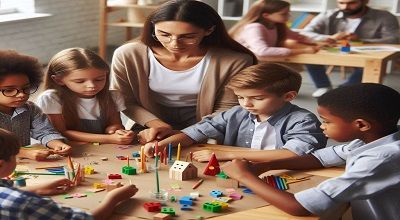Project-Based Learning In The Elementary Classroom
Project-Based Learning in the elementary classroom is an effective and engaging teaching method that allows students to gain knowledge and skills through hands-on, real-world projects. In the elementary classroom, PBL can be especially beneficial in fostering critical thinking, collaboration, and creativity. Here’s a planning guide to help you implement Project-Based Learning in the elementary classroom:
1. Identify Learning Objectives:
- Clearly define the learning goals and standards you want to address.
- Align objectives with curriculum standards and grade-level expectations.
2. Select a Compelling Topic:
- Choose a topic that is relevant, interesting, and meaningful to your students.
- Ensure the topic has multiple entry points and can be explored from different angles.
3. Create an Engaging Driving Question:
- Develop a driving question that sparks curiosity and inquiry.
- The question should be open-ended, encouraging investigation and problem-solving.
4. Plan Project Phases:
- Break down the project into manageable phases or steps.
- Consider a timeline that allows for in-depth exploration without rushing.
5. Design Authentic Assessments:
- Develop assessments that align with learning objectives and project goals.
- Include a mix of formative and summative assessments to gauge student progress.
6. Incorporate Technology:
- Integrate technology tools that enhance learning and research.
- Use digital platforms for collaboration, presentations, and documentation.
7. Promote Collaboration:
- Encourage teamwork and collaboration among students.
- Assign roles within groups to ensure everyone contributes.
8. Provide Resources:
- Gather resources, including books, articles, videos, and experts related to the project.
- Ensure resources are accessible and age-appropriate.
9. Facilitate Inquiry and Exploration:
- Foster a classroom environment that encourages curiosity and questioning.
- Allow students to explore different aspects of the project based on their interests.
10. Integrate Cross-Curricular Connections:
- Find opportunities to connect the project to various subjects.
- Identify how math, science, language arts, and other subjects intersect with the project.
11. Include Reflection Opportunities:
- Build in time for students to reflect on their learning experiences.
- Use journals, discussions, or other reflective activities to help students think deeply about the project.
12. Celebrate Achievements:
- Provide opportunities for students to showcase their work to the class, parents, or the community.
- Celebrate the learning process, not just the final product.
13. Adjust and Reflect:
- Be flexible and open to adjustments based on student needs and interests.
- Reflect on the project after completion to improve future PBL experiences.
14. Encourage Presentation Skills:
- Include a culminating presentation where students share their findings and experiences.
- This helps develop communication and presentation skills.
15. Seek Feedback:
- Gather feedback from students about the project.
- Use this feedback to refine your approach for future projects.
16. Evaluate and Assess:
- Evaluate the success of the project based on learning objectives.
- Assess both individual and group contributions.
Final Words
By following this guide, you can create a meaningful and effective Project-Based Learning experience for elementary students, fostering a love for learning and promoting essential skills for the future.
